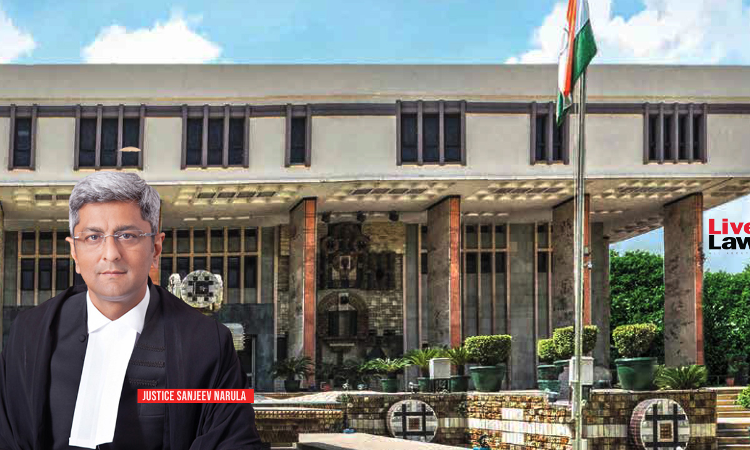- Home
- /
- High Courts
- /
- Delhi High Court
- /
- Delhi High Court Denies Relief To...
Delhi High Court Denies Relief To Man Convicted For Life For Abducting Foreign Nationals To Pressurise Govt To Release Jailed Militants
Nupur Thapliyal
8 Sept 2025 2:30 PM IST
The Delhi High Court has denied relief to a man convicted for life in 2002 for being part of a “terrorist conspiracy” of abducting four foreign nationals with the objective of pressuring the Indian Government to release jailed militants.Justice Sanjeev Narula rejected the plea filed by Nasir Mohd Sodozey alias Aftaab Ahmed against an order dated 30th June, 2023 passed by the Sentence...
The Delhi High Court has denied relief to a man convicted for life in 2002 for being part of a “terrorist conspiracy” of abducting four foreign nationals with the objective of pressuring the Indian Government to release jailed militants.
Justice Sanjeev Narula rejected the plea filed by Nasir Mohd Sodozey alias Aftaab Ahmed against an order dated 30th June, 2023 passed by the Sentence Review Board rejecting his request for premature release.
Upholding the SRB's rejection, the Court observed that while prolonged incarceration is a relevant factor and must weigh with the reviewing authority, it cannot prevail over the larger interests of society where the underlying crime was designed to destabilise the State and spread fear among its citizens and international visitors.
"In the present case, the act of abducting foreign nationals was calculated to project a threat against the sovereignty of India, with international ramifications. Such an act not only undermined domestic security but also tarnished India's standing before the world community. Against this backdrop, the balance tilts decisively in favour of societal and national security concerns,” it added.
Sodozey was convicted in 2002 by special judge for the offences under Sections 121A, 122 and 124A of IPC, Sections 3(1) and 3(5) of the TADA Act and Section 14 of the Foreigners Act. He was sentenced to death. However, in 2003, the Supreme Court commuted the death sentence to life imprisonment.
It was the convict's case that the maximum prescribed term of incarceration, inclusive of remissions, is capped at 25 years and thus, having already completed more than two decades of incarceration, he satisfied the threshold under the 2004 policy of the Delhi Government and ought to have been positively considered for release.
It was submitted that he had already crossed the outer limit, having undergone incarceration for over 26 years and his continued detention was contrary to the mandate of the 2004 policy.
The police department opposed the plea citing the convict's past association with Ahmed Omar Saeed Sheikh, one of the principal conspirators, who was subsequently released in 1999 following the hijacking of Indian Airlines Flight IC-814.
It was thus apprehended that the convict's release may rekindle networks or sympathies hostile to the State.
Rejecting the plea, the Court noted that the offence for which the petitioner was convicted was of the “gravest order”. He abducted and held captive four foreign nationals, not for private gain or personal animosity, but with the intent of compelling the sovereign Government of India to yield to the demands of a militant organisation- Harqat-ul-Ansar.
It further said that the act was calculated, deliberate and carried out as part of a terrorist conspiracy to subvert the authority of the State and coerce governmental policy by unlawful means, which was not merely an ordinary crime but an attack upon the very fabric of civil order, striking at the rule of law and the security of the State.
“The broader objective, employing fear and intimidation to secure political ends, marks this case apart from conventional offences, placing it in a category of exceptional gravity,” it added.
Noting the convict's past association with Sheikh, Justice Narula said that the release of Sheikh under extreme duress and in exchange for hostages, stands as a reminder of the far-reaching consequences of the conspiracy in which the convict was involved.
The Court said that at best, a life convict acquires a right to have his case considered under the prevailing policy but he cannot demand release as a matter of right.
“In view of the foregoing discussion, this Court is of the opinion that, despite the long incarceration undergone by the Petitioner, the nature of the offence, its broader societal impact, and the legitimate concerns of national security remain overriding considerations,” the Court said.
“The factor of 'welfare of society', expressly recognised in the remission policy, is of wide amplitude and encompasses considerations such as the nature of the offence, its potential impact on public order and national security, and the confidence of the community at large,” it added.
Title: NASIR MOHD SODOZEY @ AFTAAB AHMED @ ABDULLAH v. STATE GOVT OF NCT OF DELHI
Citation: 2025 LiveLaw (Del) 1069



